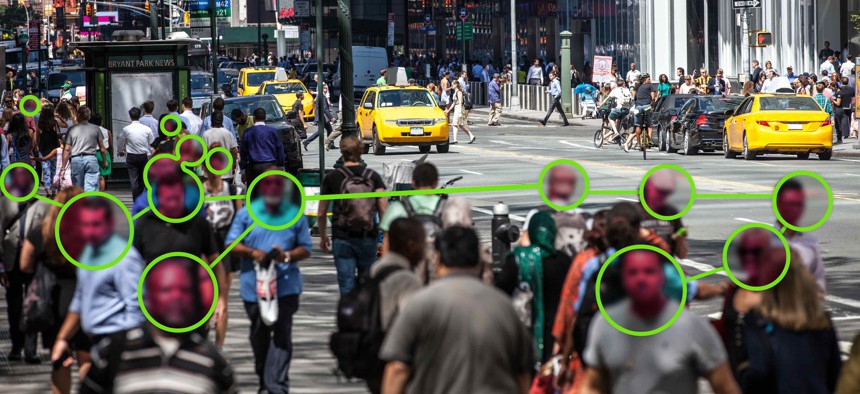Report: What City Officials Need to Know About Facial Recognition Technology

Facial Recognition technology used in New York City. iStock.com/LeoPatrizi
How local governments are deploying facial recognition systems, as well as the technology's benefits and challenges, are addressed in a report from the National League of Cities.
Facial recognition is used by companies, law enforcement and government agencies to capture people's images by video and photo to help identify an unknown person. A recent report by the National League of Cities addresses issues surrounding facial recognition and governments’ ability to balance transparency with effectiveness and efficiency.
The report comes as cities grapple with the challenges and benefits of facial recognition policies. Some cities and counties have banned facial recognition technology and some are putting the technology up for a vote.
Other local governments have limited the scope and size of their facial recognition technology use. Those cities include New York, Seattle, Detroit, Nashville and Pittsburgh among others. Meanwhile, New Orleans, San Francisco, Boston, Oakland, California, and Portland, Oregon, are cities that have banned the use of the technology.
Three states have specifically banned law enforcement from using facial recognition on body cameras: California, New Hampshire and Oregon. However, the NLC paper says facial recognition can bring efficiencies into the police investigation process.
There is no federal legislation to pre-empt or nullify local governments’ use of the technology.
Cities have a responsibility to the public to effectively regulate facial recognition technology, according to the report. To help cities better facilitate facial recognition discussions in their communities, the NLC made five recommendations.
One recommendation by the NLC is to have cities engage with the public to help develop policies surrounding facial recognition tools and be transparent about their use. Secondly, the report suggests establishing a training program for law enforcement and other users of facial recognition systems to provide more oversight over their management and implementation.
The NLC also recommends limiting the scope of facial recognition technology to lower the risk of misidentifications and privacy violations. It is reported that civil rights organizations have long criticized the lack of oversight around facial recognition, citing that the emerging technology is more likely to misidentify Black and Asian people.
Two more suggestions: Cities should develop rigorous standards for the storage of facial recognition data, as well as implement effective cybersecurity to ensure the biometric data is fully protected. Lastly, the NLC advises that managers of facial recognition systems follow best practices for drafting contracts to reduce legal risk and certify the accuracy of their algorithms.
To get more information from the NLC about facial recognition click here.
Brent Woodie is an associate editor at Route Fifty.
NEXT STORY: Modernize government service delivery with automation





